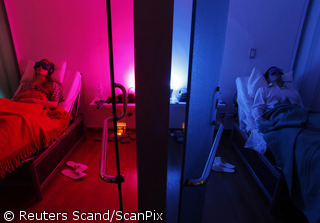European Union supporters in Latvia and Estonia expressed concern Thursday about a new survey pegging their countries as the most EU-skeptical in Europe
Published:
4 August 2003 y., Monday
European Union supporters in Latvia and Estonia expressed concern Thursday about a new survey pegging their countries as the most EU-skeptical in Europe—findings that come just two months before both Baltic states hold referendums on membership. A mere 32 percent of Estonians and 37 percent of Latvians agreed entry would be "a good thing," making them the most pessimistic of those questioned in the EU study released Wednesday. By contrast, 72 percent of Cypriots and 61 percent of Poles said joining would be good for them.
Latvia and Estonia will be the last of 10 EU candidate countries to put the issue of entry to a vote—and observers say there's now a chance that one or both nations could become the first to reject membership in Europe's most powerful multilateral club.
"People are afraid, they don't know what to believe and they're confused," said Pille-Mai Helemae, spokeswoman for the high-profile "Yes to the EU" group in Estonia. "It's going to be a hard fight. But in the end, I'm sure enough people will see more pros than cons to membership." Confusion about the EU was illustrated in the biannual Eurobarometer _ which questioned 1,000 people in each candidate nation in May—with 62 percent of Latvian and 71 percent of Estonian respondents saying they were either poorly informed about the accession process or not informed at all.
The Czech Republic, Hungary, Lithuania, Poland, Slovakia, Slovenia and Malta have already approved EU referendums, most by wide margins. Cyprus is leaving it's decision to lawmakers. If Estonia and Latvia pass their plebiscites on Sept. 14 and Sept. 20 respectively, they would join the EU together with the other candidates in 2004.
Virtually all top leaders in Estonia and Latvia have been pro-EU since the Baltic Sea nations regained independence—arguing that entry will raise their nations international stature, forge vital European trade links and boost living standards.
But official enthusiasm has never been matched outside the halls of power, with many Estonians and Latvians fearing a loss of sovereignty to the EU. Anti-EU groups compare what they say is an overly centralized EU with the U.S.S.R.; one of their symbols is an EU flag stamped with a Communist hammer and sickle.
If the results of the latest survey spooked EU supporters, they delighted opponents. "If you're a EU supporter, I believe the picture is even blacker," said Uno Silberg, who heads Estonia's "No to the EU Movement." "We're confident the referendum will fail."
Šaltinis:
balticsww.com
Copying, publishing, announcing any information from the News.lt portal without written permission of News.lt editorial office is prohibited.
The most popular articles
 Hundreds of New Yorkers enjoy a dip in rubbish dumpsters that have been converted into swimming pools as part of the city's summer initiative.
more »
Hundreds of New Yorkers enjoy a dip in rubbish dumpsters that have been converted into swimming pools as part of the city's summer initiative.
more »
 On 19 July, a school, which had been reconstructed with the funding from Lithuania’s Special Mission in Afghanistan, was opened in the village of Suri, the Zabul Province in the South of Afghanistan.
more »
On 19 July, a school, which had been reconstructed with the funding from Lithuania’s Special Mission in Afghanistan, was opened in the village of Suri, the Zabul Province in the South of Afghanistan.
more »
 Self-employed workers and their partners will enjoy better social protection – including the right to maternity leave for the first time – under new EU legislation that enters into force today.
more »
Self-employed workers and their partners will enjoy better social protection – including the right to maternity leave for the first time – under new EU legislation that enters into force today.
more »
 A 45 U.S. dollar garage sale purchase turns out to be long lost Ansel Adams negatives worth 200 million dollars.
more »
A 45 U.S. dollar garage sale purchase turns out to be long lost Ansel Adams negatives worth 200 million dollars.
more »
 A Turkish toddler survives a three-floor fall from a balcony when he lands on a stack of plastic pipes.
more »
A Turkish toddler survives a three-floor fall from a balcony when he lands on a stack of plastic pipes.
more »
 Around 200 Magellan penguins, most of them dead, wash up on Uruguay's beaches.
more »
Around 200 Magellan penguins, most of them dead, wash up on Uruguay's beaches.
more »
 Europeans are calling on Member States to boost their efforts to improve road safety, according to a survey published by the European Commission today.
more »
Europeans are calling on Member States to boost their efforts to improve road safety, according to a survey published by the European Commission today.
more »
 With an increase in life expectancy in China has come an accompanying rise in dementia cases, which may leave the younger generation struggling to cope with treatment and care.
more »
With an increase in life expectancy in China has come an accompanying rise in dementia cases, which may leave the younger generation struggling to cope with treatment and care.
more »
 These baby sea turtles should be swimming in the Gulf of Mexico, but instead they are recovering at the Institute for Marine Mammal Studies in Mississippi.
more »
These baby sea turtles should be swimming in the Gulf of Mexico, but instead they are recovering at the Institute for Marine Mammal Studies in Mississippi.
more »
 Reviving the Latin American tradition of the afternoon siesta, a hotel in Argentina brings siesta to the corporate workforce.
more »
Reviving the Latin American tradition of the afternoon siesta, a hotel in Argentina brings siesta to the corporate workforce.
more »